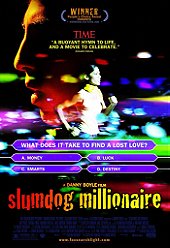Underdog stories are a dime a dozen, and that's the reason why it's so difficult to come up with above-average movies that follow said type of storyline yet don't feel like recycled material. So, how DID director Danny Boyle manage to create such a good underdog story with Slumdog Millionaire?
A. His film has the best soundtrack of the year
B. Though set in India, his film has a universal quality to it that will make it appealing to all moviegoers
C. The main character is one of the most likable underdogs we've ever seen in this type of movie
D. All of the above
18-year-old Jamal Malik (Dev Patel) was raised in the slums of Mumbai, India, and now works at a telephone company's call center, not as an actual phone operator, but as a chaiwalla (tea server). So, when he becomes a contestant on India's version of the popular game show Who Wants To Be A Millionaire? no one expects him to do well at all. He manages to answer the penultimate question correctly for 10 million rupees, and time runs out before he can be asked the final question for 20 million rupees, so he'll have to come back the following day for the next episode. As soon as he leaves the set, police take him away to interrogate him, believing he must have cheated his way through the questions. This marks the start of the narration of Jamal's story, which gradually reveals how the answers to the specific questions he was asked were all things he came across at some point in his life as a slumdog.
I'm sure it wasn't hard to figure it out, but the answer to the question was indeed D. All of the above. Slumdog Millionaire is blessed with an energy-filled soundtrack that fits every scene very well and makes the scenes have a vibrancy that they'd lack if they didn't have such great music as their background. Another noteworthy aspect here is that the awesome theme music for the show Who Wants To Be A Millionaire? is used to great effect here, particularly during the final scenes that involve Jamal's participation on the show. It's no coincidence that the filmmakers chose this particular TV show as a piece of the plot, as it makes it recognizable to everyone; while the film is about an underdog in India, the fact that he's trying to win the grand prize on a show like this one will make it easy for people around the world to root for him. Speaking of that, rooting for Jamal turns out to be extremely easy to do, as Dev Patel is note-perfect. He doesn't fall into the trap that most actors and actresses playing underdogs would fall into of overplaying the nervousness. While on the "hot seat," he infuses a lot into what could've easily been dull blank stares if anyone else had been playing the role, and the random moments in which he says something funny to break the tension are great.
One of the reservations some may have with Slumdog Millionaire is something that I had figured would probably be a problem before I watched the film, while reading the synopsis; obviously, it's awfully convenient that Jamal happened to run into situations throughout his childhood in which the answer to a question he'd be asked years later on a game show was somehow exposed to him, and that he'd always manage to remember it. However, I think this is forgivable because you just NEED that contrivance for the movie to be able to move forward. Similarly, some may not like that the film has a standard-order happy ending, but that, too, is okay because, when it comes down to it, despite great things like the soundtrack and Patel's performance that elevate this movie above average fare, this still is a conventional underdog story, and there's no avoiding that. However, there are certain flaws that can't exactly be overlooked. While the predictable happy ending is to be expected, the film overplays the destiny card ("it is written") in order to justify said happy ending; it's fine to have destiny be an element that contributes to navigating the plot, but it's not fine to make an exaggerated amount of references to it, almost as if it were necessary to do so to explain why any other type of conclusion would be impossible. Also, most of the flashback scenes depicting Jamal's childhood work pretty well, though some don't ring as true and aren't as engaging - basically, even though it's obviously the same character, I definitely cared more about older Jamal than about younger Jamal. The romantic element of the plot is helped immensely by a resonant, sublime score (again, all of the music-related elements are perfect), yet the story itself isn't the most interesting on-screen romance we've ever seen; we root much more for Jamal to answer that final question correctly than we do for him and the girl he loves to stay together.
All in all, though, there are plenty of things that make this far better than your standard rags-to-riches story. The folks over at Awards Circuit are referring to Slumdog Millionaire as the current front-runner in the Best Picture race, and while I admit that I disagree with that and could name several other films released this year that have been superior to it, it's hard to ignore what a wonderfully colorful and euphonious piece of cinema this is. Oh, and if you go see it, do NOT stand up right when the movie has seemingly ended and the screen fades to black, because the film's last scene is followed by an amazingly well-choreographed Bollywood dance sequence that you simply can't miss. It's better than any musical number we've witnessed in film this year (and puts to shame the crap that tried to pass as dance sequences in Mamma Mia!), and it's a worthy conclusion to this delightful movie-watching experience.
7/10
 Login
Login